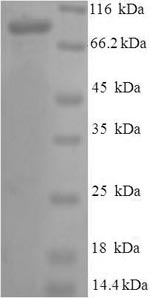Discover our Recombinant Human PROS1 protein, meticulously designed to support your cardiovascular research needs. This full-length, mature Vitamin K-dependent protein S is expressed in an E. coli system, covering the 42-676aa region for optimal performance in your experiments.
Featuring an N-terminal 6xHis-SUMO tag, this protein allows for efficient purification and detection processes. Our Recombinant Human PROS1 protein boasts a purity greater than 90% as determined by SDS-PAGE, and is available in both liquid and lyophilized powder forms to meet your specific research requirements. Trust our precision-engineered PROS1 protein to deliver consistent, dependable results for your cardiovascular studies.






